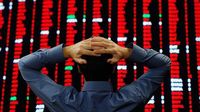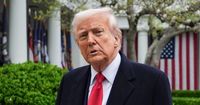U.S. stock futures plunged on Sunday evening, April 6, 2025, signaling that the market turmoil that began last week is set to continue when trading opens on Monday, April 7. The Dow Jones Industrial Average futures fell 1,272 points, or 3.3%, while S&P 500 futures shed 4.8% and Nasdaq-100 futures dropped 5.3%. This downturn comes on the heels of a historic two-day sell-off that wiped out $6.6 trillion in market value, marking the worst performance since the COVID-19 pandemic.
The sell-off was triggered by President Donald Trump’s announcement of sweeping trade tariffs, which took effect on Saturday, April 5. The initial 10% tariff applies to most U.S. imports, with higher rates on key trading partners, including China, set to take effect on April 9. In retaliation, China announced a 34% tariff on all U.S. imports, escalating the trade conflict and raising fears of a global economic downturn.
Trump, addressing the market's sharp decline, stated, "I don't want anything to go down, but sometimes you have to take medicine to fix something." He emphasized that the tariffs are necessary to address the significant trade deficit with China, which he described as a "trillion-dollar problem." Commerce Secretary Howard Lutnick confirmed in an interview that the tariffs would not be postponed, stating, "They are definitely going to stay in place for days and weeks." Treasury Secretary Scott Bessent also noted that over 50 countries have approached the administration for negotiations, but cautioned that resolving these issues would take time.
The market's reaction has been severe, with the S&P 500 posting a 6% drop on Friday, its worst performance since March 2020, and the Nasdaq Composite entering bear market territory, down 22% from its peak. Analysts are warning that the sell-off may worsen, as hedge funds are forced to liquidate positions to meet margin calls. The CBOE Volatility Index, a measure of market fear, surged to levels typically seen during bear markets, closing at 45 on Friday.
Market analysts are drawing parallels to the infamous Black Monday of 1987, where the market dropped 22.6% in a single day. CNBC host Jim Cramer warned that the U.S. could be barreling toward another crash if the administration does not engage constructively with trading partners. "If the president doesn't reach out and reward countries and companies that follow the rules, then the 1987 scenario becomes highly relevant," he said.
Global markets reflected similar concerns. Japan's Nikkei 225 index plummeted more than 8%, while Australia's S&P/ASX 200 and South Korea's Kospi indices fell by 5.9% and 5%, respectively. Bitcoin, which had previously resisted the broader market downturn, also saw a decline, falling under $80,000. The main U.S. benchmark for crude oil dropped 3.7% to just under $60 per barrel, its lowest level since April 2021.
Despite the chaos, Trump remains resolute in his tariff strategy. He declared on social media, "THIS IS AN ECONOMIC REVOLUTION, AND WE WILL WIN. HANG TOUGH." He asserted that the tariffs are already bringing in billions of dollars and reversing trade surpluses with other countries. However, many economists and business leaders are voicing concerns about the long-term implications of such aggressive trade policies.
Elon Musk criticized the tariffs, suggesting they could harm American businesses reliant on global supply chains. In response, senior adviser for trade and manufacturing, Peter Navarro, defended the administration's approach, arguing that it is necessary for the country's economic future. This tension highlights the divide between the administration's trade policies and the realities faced by many businesses.
As the market braces for another turbulent week, investors are left wondering about the sustainability of any potential recovery. While some analysts predict a short-term bounce, the overarching sentiment remains one of caution. Mark Malek, chief investment officer at Siebert Financial, stated, "The bull market is dead," indicating that any gains in the coming days may not be sustainable.
Federal Reserve Chairman Jerome Powell has also weighed in, noting that the Fed is not in a rush to change interest rates despite the economic uncertainty. He acknowledged that the tariffs could lead to higher prices and job losses, complicating the Fed's decision-making process. Powell emphasized the need for a clearer understanding of the economic fallout before making any moves.
In the midst of this turmoil, everyday Americans are feeling the impact, with 401(k)s and retirement savings taking a hit. The market's volatility is not just a concern for Wall Street; it has real implications for families across the country. As the situation unfolds, the focus will remain on how the administration navigates these turbulent waters and whether it can find a resolution with key trading partners.
As Wall Street prepares for the trading day, the question remains: will the administration's bold tariff strategy lead to the economic revival Trump envisions, or will it result in prolonged instability and recession? Only time will tell as the markets respond to the unfolding drama on the international trade front.





